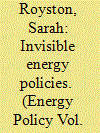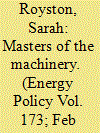| Srl | Item |
| 1 |
ID:
162299


|
|
|
|
|
| Summary/Abstract |
This article makes the case for a new and ambitious research and governance agenda for energy demand reduction. It argues that existing ‘demand-side’ approaches focused on promoting technological efficiency and informed individual consumption are unlikely to be adequate to achieving future carbon emissions reduction goals; it points out that very little attention has so far been paid to the impacts of non-energy policies on energy demand; and it submits that a much fuller integration of energy demand questions into policy is required. It advances a general framework, supported by illustrative examples, for understanding the impacts of ‘non-energy’ policies on energy demand. It reflects on why these connections have been so little explored and addressed within energy research and policy. And it argues that, for all their current ‘invisibility’, there is nonetheless scope for increasing the visibility of, and in effect ‘mainstreaming’, energy demand reduction objectives within other policy areas. Researchers and policymakers, we contend, need to develop better understandings of how energy demand might be made governable, and how non-energy policies might be revised, alone and in combination, to help steer long-term changes in energy demand.
|
|
|
|
|
|
|
|
|
|
|
|
|
|
|
|
| 2 |
ID:
191184


|
|
|
|
|
| Summary/Abstract |
Economic modelling plays a major role in the development, justification and evaluation of energy policies. However, there has been little investigation of how political dynamics systematically influence these models' development and outputs, or the implications for energy strategies, targets and interventions. Using in-depth interviews with 24 European modellers and policyworkers, we illuminate the politics of economic modelling within European Union (EU) energy policymaking, focusing on dynamics of contestation, differentiated influence and power relations within models' a) framing of questions and problems; b) framing of scenarios and solutions; c) structural assumptions and d) definition of quantitative data inputs. We then consider deeper questions of e) access and exclusion, showing how modelling is used to silence critical voices and reinforce incumbent interests. We argue that understanding this politics of modelling is crucial to the implementation of sustainable energy transitions. We conclude with recommendations for researchers and policyworkers seeking to promote the use of alternative/innovative models in energy policy (within and beyond the EU), centring on reflexivity; recognition; and relationship-building. Developing multi-sectoral ‘communities of practice’ around innovative modelling approaches is vital in challenging a vicious circle of evidence and policy that legitimises business-as-usual in a dangerously warming world.
|
|
|
|
|
|
|
|
|
|
|
|
|
|
|
|